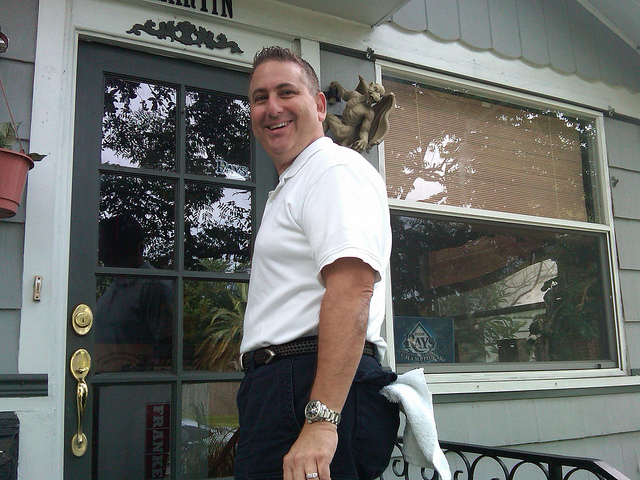
State Rep. Rick Kriseman, pictured here campaigning in St. Petersburg, introduced a recall bill on the same day Gov. Rick Scott turned down federal funding for the state's high-speed rail. (Photo courtesy of Rick Kriseman.)
By Ralph De La Cruz
Florida Center for Investigative Reporting
On Monday, I chatted with the man who, either willingly or unwillingly, has become the face of recall.
State Rep. Rick Kriseman, the three-term Democratic representative from St. Petersburg, has introduced a bill that would make it possible for voters to recall state officials. Currently, the only way to get rid of a governor or a legislator in Florida is through impeachment.
Related Story |
Which means it isn’t happening, particularly when one party has a stranglehold on the governor’s office and state legislature.
“It’s not going to happen,” Kriseman says. “We saw that with Ray Sansom. The legislature is not going to take any action against itself. It rings very hollow.”
Sansom was House Speaker when it was revealed he had feathered the nest of contributors and supporters. He stepped aside as speaker, but remained in his seat for almost a year after being indicted.
And so, with memories of Sansom still fresh, Kriseman introduced what would become House Joint Resolution 785.
And then fate stepped in.
“The day we filed the bill,” Kriseman remembered, “was also the day that the governor (Rick Scott) made his announcement on (turning down $2.4 billion for a high-speed rail line from Orlando to Tampa),” Kriseman said.
The rail project, which had been in the works for more than a decade, was expected to produce tens of thousands of much-needed jobs to Florida. Suddenly, his bill was seen as an outcry against a governor who seemed out of touch with his constituency. A governor who killed a computer database that would track prescriptions for addictive painkillers, who is proposing gutting public school funding while funneling money to private schools, and decimating an already understaffed Department of Children and Families.
The list of grievances in less than two months in office are too numerous to list here. It could — and has — filled an entire blog item.
“I had more visitors to my website in one day than I usually get in a week,” Kriseman said. “Our office was flooded with calls from all over the state. A lot of the people were actually disappointed that it wouldn’t let them recall the governor immediately.”
You see, Kriseman’s bill doesn’t make it easy to recall a governor, lieutenant governor, cabinet member or legislator. It requires that signatures be collected from each of the state’s 67 counties. And that the signatures equal 15 percent of the total votes cast in the last election for the office. For a recall of a legislator, it would require signatures from 20 percent of the total votes cast in the last election for the office. That would be about a million signatures.
And that’s just to allow a recall to be put on the next election ballot.
Pretty stiff hurdles.
And yet, Kriseman’s bill has been received with silence.
“It hasn’t moved,” he says.
How can that be, considering that the legislature has a super-majority of Republicans and the Republican party prides itself as the party of accountability? And it’s not as if the principle of recall isn’t accepted. Just ask Miami-Dade Mayor Carlos Alvarez.
“The legislature has a history of imposing rules and regulations on everyone else but itself,” Kriseman says. “This seems to fit the pattern.”
But whether it moves forward, or not. Whether he intended it to be this way, or not. Rick Kriseman has become the face of recall at a time when there is widespread outrage — and a growing cry for accountability from a man who sees himself more as CEO than governor.
“I view my job — especially being in the minority, the super-minority actually — to be the voice for the voiceless,” Kriseman says. “I take that role very seriously. If through my legislation, I’m giving some people the chance to say what’s on their mind, I’m glad.”
Kriseman flashes back to a recent appearance by Scott at a St. Petersburg Chamber of Commerce function.
“He said it was easy for people to contact him — as long as they agreed with him,” Kriseman said. “He said, ‘If you don’t agree with me, don’t bother calling me.’ I’ve been in public service for 10 years. The arrogance of a comment like that is … amazing. Even conservatives and Republicans are turned off by that.”
While lawmakers have remained on the sidelines, the reaction from the public has been far from silent. Voiceless they’re not.
“It’s been pretty amazing, actually,” Kriseman marvels.
Kriseman’s Facebook page now has almost 2,000 friends and has become a rallying point for discontentment against Scott.
“Virtually all the comments have been supportive,” Kriseman says. “It’s really something.”
Virtually. Luckily for our comic relief, there have been a couple of negative comments. The page includes a link to a YouTube video featuring a message from an enraged Tea Partier. It’s worth a chuckle:
